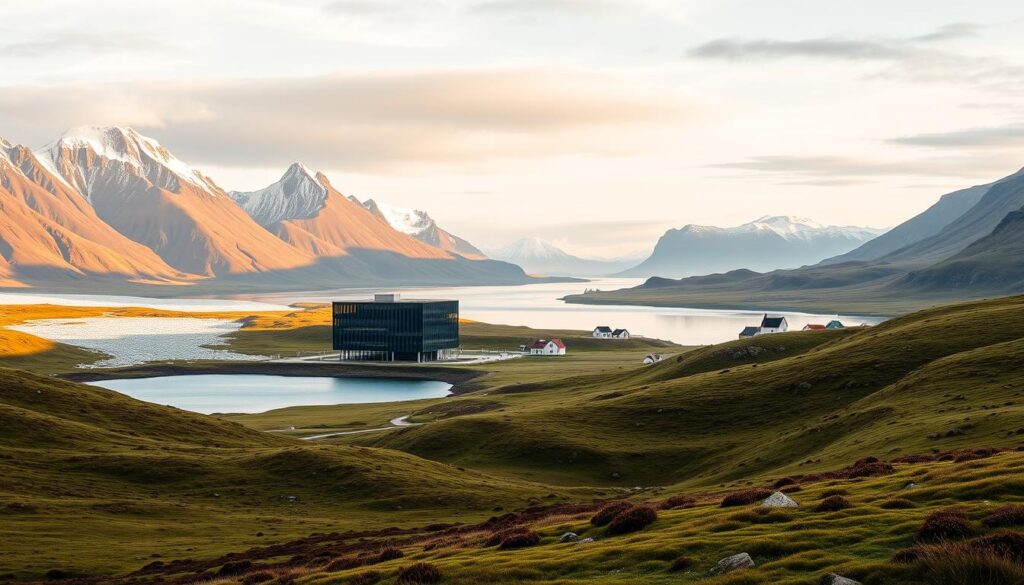smart investors seeking new ventures need tailored advice for investing in Iceland. Knowing the local market and Iceland’s unique economy is key to success. This small nation has lots of opportunities for foreign investors, but it’s important to be careful and well-informed.
There are many risks and challenges in investing here. It’s crucial for investors to understand Iceland’s social and economic setup. Investing here means making choices that fit with the country’s changing economy, not just looking for profits.
Anúncios
The Landscape of Investing in Iceland
Iceland’s investment scene is unique, thanks to its geography and economy. With just 320,000 people and a large area, it has Europe’s lowest population density. This results in a specialized workforce, which benefits certain industries.
Exports, especially fishing and aluminum, are big in Iceland’s economy. Foreign investments are crucial, especially after the financial crisis. A Capacent Gallup poll found 92% of Icelandic leaders see foreign investments as essential for economic recovery.

Iceland’s spot between North America and Europe opens more chances. Its focus on renewable energy fits global eco-friendly trends. This mix makes Iceland’s investment landscape varied and dynamic, appealing to different investment styles.
Understanding Iceland’s Unique Economic Conditions
Iceland’s economy is unique, thanks to its abundant natural resources and stable investment climate. It leans heavily on sustainable practices. This is clear from its use of renewable energy, like geothermal and hydroelectric power. Such efforts draw investors interested in eco-friendly projects.
The country’s economy benefits from key sectors, with fishing playing a major role. Fishing helps local communities and boosts global exports. Being part of a free-market economy, it opens doors for various investment opportunities.
To invest in Iceland, one must grasp its market trends. Knowing about its push for tech and sustainability offers a glimpse into future growth areas. It’s vital for investors to monitor these trends. They impact Iceland’s economic health.
Investment Opportunities in Iceland
Investors looking for new paths will find Iceland’s economy exciting. Its natural resources and innovation focus offer many investment chances. These include renewable energy and technology startups.
Exploring Renewable Energy Investments
Iceland is a prime spot for renewable energy investment. It’s rich in geothermal and hydroelectric power. Yet, about 30-40% of its energy sources are still not used. This opens big chances for investing in green energy projects.
The Rise of Technology Startups
Iceland’s tech startups are on the rise, thanks to its skilled workers and government support. This boom in tech makes investing there more appealing. It’s great for those wanting to put money into technology.
Key Sectors for Foreign Investment
Iceland is a great place for global investors because of its key sectors. The fishing industry is very important here. Also, tourism is growing fast, offering new chances for making money. Both areas offer good opportunities for profits.
The Fishing Industry’s Global Standing
The fishing industry is a big deal in Iceland, being the second-largest in Europe. It helps many locals make a living and attracts foreign investments. Companies that like to work in ways that are good for the planet see Iceland as a great choice. This is because Iceland makes sure fishing is done in an eco-friendly manner.
Iceland’s tourism has grown a lot, with more people visiting every year. There’s a focus on sustainable travel and cultural experiences now. This makes investing in hotels, restaurants, and services a smart move. Foreign investors have a chance to do well by offering things that are eco-friendly and show the real Iceland.
Investment Restrictions You Should Know
Iceland has a special investment scene for those from outside. But, certain rules can be tough. Knowing these rules is key to handle Iceland’s regulations well. Foreigners face limits in important areas, like fishing and energy.
It’s important for foreign businesses to work with local partners or create joint ventures. This follows Iceland’s strict rules that protect its own interests. For example, foreign ownership in fishing is capped at 25%. In airlines, it’s limited to 49%.
Knowing these rules can stop legal problems and help you enter the market successfully. As Iceland becomes more popular for foreign investment, understanding these regulations is more important.
Tax Advantages for Investors in Iceland
Iceland offers investors great chances to make the most of their money. The country has a corporate tax rate of just 15%, one of the lowest compared to other developed countries. Such a low rate helps companies save more money, which they can then use to grow or pay their shareholders more.
The tax system in Iceland is also simple and easy to follow. This is good for investors because they can easily understand the tax rules. Plus, Iceland has agreements with many countries that prevent double taxation. This means businesses can operate internationally with fewer tax headaches.
Attracting foreign investment is important to Iceland. The government gives out various incentives to encourage companies from around the world to do business there. These incentives help investors work out better financial plans. This allows them to make more money while sticking to the tax rules in Iceland.
Investment Advice for Savvy Investors in Iceland
To succeed in investing in Iceland, it’s key to plan well and know the local markets. Investors should use methods that match Iceland’s economy. It’s important to stay updated on market trends to spot growth chances.
Strategies for Maximizing Returns
Here are some tips to help increase your chances of good investment results:
- Do deep research on the economy, especially on up-and-coming areas like renewable energy and tech.
- Work with local businesses or advisors who know a lot about the market and its rules.
- Keep an eye on global political trends that might affect your investments.
Understanding Local Market Trends
Knowing about current market trends can guide investors through complex decisions. Important trends that affect investments include:
- An increasing focus on green practices in all industries.
- Technological breakthroughs that open new business possibilities.
- Changes in the tourism industry that bring in more foreign investors.
Political and Regulatory Environment for Investors
Iceland offers a welcoming space for foreign investors, thanks to its political climate. Leaders here follow a liberal economic approach. They see foreign investment as key for the country’s recovery. This stance invites investors to dive into Iceland’s economy and utilize its vast resources.
Yet, there’s a catch due to environmental worries, especially with big projects in energy and aluminum. These concerns can affect what people think and how investors plan. So, investors need to keep up with new laws and public views. Changes could alter the playing field for them.
For investors to thrive in Iceland, staying updated on regulation changes is crucial. Working with local legal pros and joining industry groups can help follow rules. Staying in tune with political debates and laws helps investors make smart choices.
Challenges Facing Foreign Investors
Investing in Iceland offers great chances. But, there are key challenges to think about. The small market size makes it hard to grow big, with a focus on just a few sectors. This can decrease chances to spread out investments and increase risk if those sectors do badly.
Currency shifts are also a hurdle in Iceland. Since the 2008 crisis, the Króna’s value has changed a lot. This can impact investment returns and make planning tough. It’s important for investors to consider these risks before entering the market.
Then, there’s public opinion on using natural resources, like fisheries and energy. Local communities often have strong views. Changes in environmental rules or community pushback can quickly alter investment chances. This creates a constantly changing environment for outsiders.
Future Prospects for Investment in Iceland
The future of investing in Iceland looks bright with many opportunities. After 2023, easing certain restrictions could boost investments in important areas. Fishing and renewable energy, previously limited, are set to change a lot. Investors will find many chances for growth as the Iceland market changes.
Potential Growth Areas Post-2023
Sectors set to grow in Iceland include:
- Technology, focusing on innovative startups that are in line with global digital movements.
- Sustainable tourism, highlighting environment-friendly ways as more customers want this.
- Renewable energy, using Iceland’s natural gifts to draw in mindful investments.
By catching these trends, investors could see great outcomes. Putting money into Iceland’s growing areas means big returns and helping its economy stay strong and green.
Conclusion
Investing in Iceland is a mix of challenges and rewards. This is because of its rich resources and changing economy. An overview shows that its tax benefits, political support, and new sectors make a strong base for investors. Knowing how to handle these parts is key to doing well.
For those ready to dive into this market, planning is key. Using local knowledge and resources helps investors make plans that fit with Iceland’s trends. The country’s focus on renewable energy and tech offers many ways to gain good returns.
In the end, a detailed investment summary outlines the chances and risks in Iceland. With careful planning and smart choices, investors can benefit from Iceland’s bright future.
FAQ
What are the advantages of investing in Iceland?
What should investors know about the local market dynamics?
Are there restrictions on foreign investments in Iceland?
How can investors benefit from the renewable energy sector?
What role does foreign direct investment play in Iceland’s economy?
What challenges do foreign investors face in Iceland?
What are the future prospects for investment in Iceland?
How can investors maximize their returns in Iceland?
Conteúdo criado com auxílio de Inteligência Artificial



